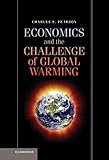Economics and the challenge of global warming / Charles S. Pearson.
Material type: TextPublication details: New York : Cambridge University Press, 2011.Description: xi, 231 p. ; 24 cm. illISBN:
TextPublication details: New York : Cambridge University Press, 2011.Description: xi, 231 p. ; 24 cm. illISBN: - 9781107011519
- 1107011515
- 9781107649071 (pbk.)
- 1107649072 (pbk.)
- 363.73874 23 P3171e
- QC903 .P395 2011
- BUS099000
| Item type | Current library | Collection | Call number | Status | Barcode | |
|---|---|---|---|---|---|---|
 Books
Books
|
JSW Law Library WR General Stacks | Non-fiction | 363.738/7 P3171e (Browse shelf(Opens below)) | Available | A00537 |
Browsing JSW Law Library WR shelves,Shelving location: General Stacks,Collection: Non-fiction Close shelf browser (Hides shelf browser)

|

|
No cover image available |

|

|

|

|
||
| 363.7 C4631f Finding solutions for environmental conflicts : power and negotiation / | 363.700973 C8815r The riverkeepers : two activists fight to reclaim our environment as a basic human right / | 363.7095498 T263y 50 years of environmental journey in Bhutan : water and climate scenario (1968- 2017) / | 363.738/7 P3171e Economics and the challenge of global warming / | 364.1/323 W6703c Controlling corruption / | 364.1/323 W6703c Corruption in the developed world / | 364.1323 Ar661c Corruption : economic analysis and international law / |
Includes bibliographical references and index.
Introduction and a roadmap -- 1. Climate change: background information -- 2. The role of benefit cost in climate policy -- 3. Discounting and social weighting (aggregating over time and space) -- 4. Empirical estimates: a tasting menu -- 5. Strategic responses -- 6. Targets and tools -- 7. Trade and global warming -- 8. The challenge of international cooperation -- 9. Beyond Kyoto -- 10. A summing-up.
"Economics and the Challenge of Global Warming is a balanced and comprehensive analysis of the role of economics in confronting global warming, the central environmental issue of the twenty-first century. It avoids a technical exposition in order to reach a wide audience and is up to date in its theoretical and empirical underpinnings. It is addressed to all who have some knowledge of economic concepts and a serious interest in how economics can (and cannot) help in crafting climate policy. The book is organized around three central questions. First, can benefit-cost analysis guide us in setting warming targets? Second, what strategies and policies are cost-effective? Third, and most difficult, can a global agreement be forged between rich and poor, North and South? While economic concepts are foremost in the analysis, they are placed within an accessible ethical and political matrix. The book serves as a primer for the post-Kyoto era"--Provided by publisher.
